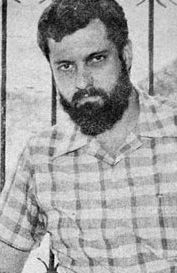It is known that Raúl Hernández Novás began writing as a teenager and that in 1960 —12 years old at the time— he published his first poem in the newspaper Hoy . Later he ventured with another in the weekly Bohemia .
He completed his undergraduate studies in Hispanic Language and Literature and developed his professional practice at the Casa de las Américas Literary Research Center, where he delved into studies that fueled his talent. There she published in 1973 her first critical work. The demanding magazine was the support through which several of her poetic texts were disseminated. Contact with the work and life of important Latin American authors enriched the aesthetic conceptions of an author in a constant process of incorporating knowledge.
It is worth pointing this out because Hernández Novás —nephew of Lino Novás Calvo , another benchmark in Cuban literature— sought formal perfection and dedicated his poetic work to the production of a work endowed with a very remarkable technical and artistic finish, achieved in the brief time of his life.
Without being alien to other strophic forms, the sonnets of Raúl Hernández Novás are models of exquisiteness. Here's a well-known one:
"See, Gelsomina?"
See, Gelsomina? you to your messy
husband you follow, I follow my husband.
The two of us have wandered along the road,
through the wasteland transit region.
(It is convenient not to settle anywhere,
in the dwellings that make us weary,
so as not to take root in beloved soil
and not forget the main thing —che è Dio).
Intact wife, like you I have traveled
from convent to convent, under the cold,
and I'm like the clown without seed
nor solar, that wanders floured...
See, Gelsomina? through the withered field
you go from your husband in pos. I follow Mine.
The writer, critic and editor Rafael Grillo opines:
There is no other example like him, of someone with such a capacity to assimilate the forms of tradition and those of his epochal environment, and at the same time renew, look for new routes, simply being faithful to his destiny and his preferences. No one could manage to divide his voice into so many tones, ranging from the lyrical to the parodic; nor multiply the echo of such varied influences, which include romanticism, modernism, the originist avant-garde, and even prefiguring the intertextual obsessions of postmodernity; or masterfully practicing poetic modes as divergent as the sonnet, the tenth and the free verse.
tightrope walker explanations
Not for the love of risk does my foot venture through this tense and light thread.
Not even for being eternal my being dares to risk life or fortune. The fertile wind that moves my wings
is not glory or fame or adventure . Not for art or love my step rains on the dark absorbed crowd. If sullen I flee to my corner of heaven and if the thread seems to me like a summit where the morning shines first, it is not love or art or the sleeplessness of glory: it is that sometimes -so many times- I feel the terror of the presence human.


Deje un comentario